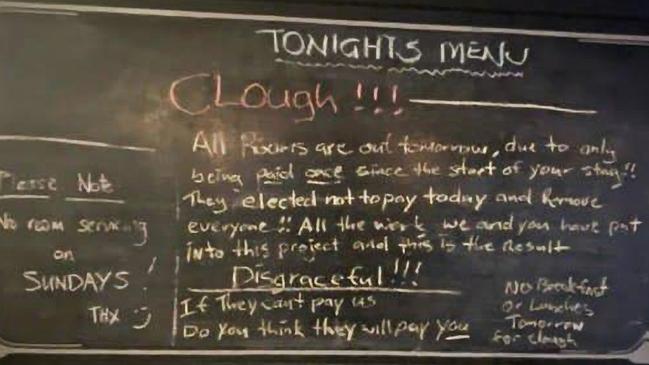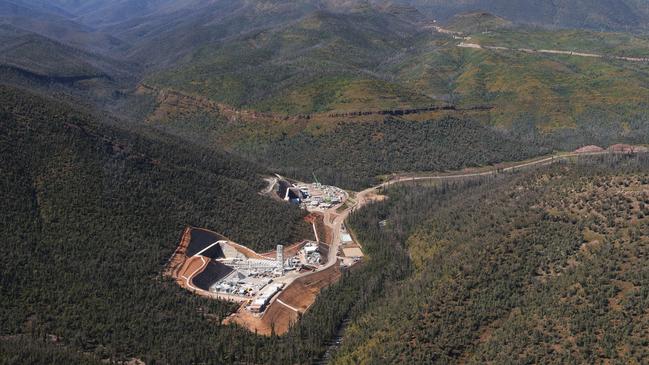How a menu blackboard told Clough workers their company wasn’t paying its bills
Clough’s failure now poses problems for major projects across the country, but how did workers find out? Via a hotel dinner menu announcing their eviction.
The dinner specials board had been wiped on Tuesday night when a few dozen Clough workers arrived back at their hotel in the small town of Dongara, near the Waitsia gas project, after a long day’s work.
In its place was an eviction notice. “Clough!!! All rooms are out tomorrow. Due to only being paid once since the start of your stay!!”
Clough had locked in 36 rooms at the hotel for months ahead of the company’s collapse, in a block booking for workers building Mitsui E&P and Beach Energy’s Waitsia gas plant.
But the company had not been paying its bills ahead of its collapse on Monday. “They elected not to pay today and remove everyone!! All the work we and you have put into this project and this is the result,” the handwritten notice said.

“Disgraceful!!! If they can’t pay us, do you think they will pay you? No breakfast or lunches tomorrow for Clough.”
For the hotel – one of only a handful in the small West Australian town, 350km north of Perth – the collapse of Clough the previous day had forced it to take the drastic action, dramatically ending a lucrative booking.
Dozens of Clough workers were forced to move into spare beds at a purpose-built camp on site at Waitsia, while others who settled for a spot at a driller’s camp nearby were paid a $100 daily allowance to make up for the accommodation switch. Staff from the hotel declined to comment when contacted on Friday.
The decision caused some short-term embarrassment for Clough staff, but it also highlights the fears and concerns of small businesses across the country that have contracts with the contractor, the oldest in Australia.
For a family-owned business, the prospect of not being paid for services provided is an existential problem. Other small businesses made similar decisions when news broke that administrators had taken control of the company.
Back at Clough’s new headquarters on St George’s Terrace, overlooking the rest of Perth’s central business district, the mood rapidly turned dark. Clough’s new offices were only opened in June, after an expensive fit-out. But some of the inner-city perks were shed immediately. When staff arrived for work on Tuesday morning, leased coffee machines were already gone. Senior staff arrived to be told their corporate credit cards had been cancelled by HSBC.
Clough chief executive Peter Bennett had fronted up to lead a town-hall meeting of shocked staff. Many of its 2500 employees were still digesting the shock announcement the previous night that a planned takeover of Clough by Webuild had collapsed, plunging the century-old contractor into voluntary administration.

Bennett had been under immense pressure for months, even if his public denials of troubles – reported in The Australian – were at odds with chaos that had begun to engulf the company, which was building several of Australia’s biggest energy and mining projects.
As far back as April, scripts had been prepared for Clough staff on how to handle demands for late payments.
Aggrieved suppliers and dozens of subcontractors had started threatening to withhold services from Clough as far back as April, but Clough had promised they were short-term cash flow issues and would soon be sorted out.
In July Bennett delivered an upbeat assessment of Clough prospects, telling staff he expected to book a solid annual profit, despite admitting the company was facing “strained balance sheet capacity to support the order book”.
But at the angry staff meeting after Deloitte took control of the company, its loyal workers made it clear they were sick of the spin, with one employee delivering a clear verdict in a question submitted through an online system.
“Why the f... should we come to f...ing work if we aren’t guaranteed being paid?” they asked.
Questions were also asked about annual leave entitlements and long service leave and, with administrators Deloitte now in charge of the company, there were no easy answers.
State of denial
Onlookers say Bennett was visibly shaken by the tone of the meeting, and was clearly nervous when addressing staff.
He did not respond to a request for comment on Friday.
The Clough boss had told staff on Monday night in an email that the company’s plunge into administration had come as a “major shock” and was “unsettling news” for its sprawling Australian and international workforce.
However, Clough was in financial trouble and struggling to pay subcontractors on time as far back as February, nine months before the company fell into voluntary administration.
Email exchanges, seen by The Australian, suggest Clough was already nearing a crisis point over cash flow problems by April and May, around the time The Australian first reported the company was looking to restructure its finances and find new lenders to fix its troubles.

At the time of the story Bennett told staff the company was in an “enviable position, with a strong order book, debt-free balance sheet, a diverse global business, and excellent prospects for winning new, high profile and exciting work.” In July Bennett told staff the company remained debt-free and was expected to book earnings of about $35m when its accounts were finalised.
When The Australian revealed in August that half a dozen senior executives had left the company amid the financial jitters, along with $2.2bn in unpaid claims on the Snowy Hydro scheme, the company went into defence mode.
The article is “reporting out half-truth information about Clough and trying to paint a pessimistic picture to a different story than what we are all doing and knowing”, Clough’s senior vice-president for operations, John Guyer, told senior staff.
“We all know why some senior people have left the business, either through poaching or bad performance (being held accountable) – not due to abandoning ship,” Guyer added.
“We continue to be contractor of choice and just need to stay calm as the story in today’s paper is not the real story that we are all working hard to achieve … safe and profitable projects.”
But cracks were becoming increasingly hard to patch up.
Clough pointed to issues posed by supply chain disruptions and rising costs such as labour and fuel, which had spilt over into the construction industry.
But while its rivals managed to mostly juggle the tough conditions, Clough faced a more fundamental problem: ensuring enough cash flow to different parts of its business.
Fixed-price contracts, most notably its share of the $6bn Snowy 2.0 venture, meant there was little wiggle room to deal with a massive cost blowout, in part triggered by the extraordinary Covid pandemic that had swept the world.

By September Clough’s parent company, South Africa’s Murray & Roberts, was forced to admit that Clough did not have an working capital facility in place and its survival was dependent on the outcome of negotiations to finalise term sheets, given looming cost requirements for several of its large projects. When its accounts were finally filed a week ago, the severity of the situation had already been laid bare.
They showed Clough borrowed some $167m from Webuild as its financial woes on the Snowy 2.0 contract deepened, with the company slumping to a $375.3m loss and a $304m working capital deficit for the year to June 30.
The speed of the financial demise of Clough – founded over a century ago in 1919 by Perth brothers Jack and Bill Clough – shocked some outsiders. Clough is a WA institution and has traditionally attracted a loyal and long-serving base of employees.
One long-time staffer took to LinkedIn this week to pay a tribute to the company that has built some of WA’s most celebrated resources projects, including Woodside Energy’s Pluto LNG plant, Chevron’s Gorgon gas project and Boddington, Australia’s largest gold mine. “Whilst it’s sad to hear Clough have gone into voluntary administration, while we wait to hear who’s going to snap up this iconic business, I think it’s a good time to recognise the amazing work Clough have accomplished over the years,” one ex-worker wrote on the social platform. “Once a Cloughie always a Cloughie. IYKYK (if you know, you know).”
Others chimed in with support.
“Over the years so many have come and gone and came back again to Clough. Including myself. Hoping for the best right now. Once a Cloughie, always a Cloughie,” another said.
But that loyalty has created additional worries for current staff, many of whom have been with the company for decades, as they face the prospect of the losing months of accrued leave if Clough is not rescued. One staffer, already serving out a notice period after quitting the company, was this week told Clough were not paying entitlements in the near future and they may have to register as a creditor to have any hope of being paid out what is owed.
Employees were briefed by the company and the administrator on Friday. Questions about this month’s and next month’s pay were not answered, but updates will be provided every two days.
Some short-term relief did arrive on Friday, with interim financing deals put in place to ensure big projects Clough was working on – including Snowy 2.0 – are built. The Weekend Australian understands that major clients have agreed to make weekly progress payments to the administrators to help keep the business ticking over until a buyer for the company is found.
A white knight may still emerge, if not for the whole business, then possibly for a portion of the empire. One of Clough’s former executives who joined NRW Holdings returned to his old stomping ground this week for talks, while sources say Webuild also remains in the tent, despite torpedoing the company with its decision to ditch the takeover.
But anger over the lack of accountability among senior Clough executives and the board remains a major sticking point.
“Bennett is trying to reassure employees not to leave and it will all be fixed in a few weeks, with many interested parties looking to purchase,” one source close to the company said on Friday. “BS I say.” Another employee described the situation as a “Cloughterfuck”.
Clough clearly faces an uphill battle for survival.
Its thousands of staff, and scores of suppliers and small business owners that face the risk of going bust themselves if not paid, need a Christmas miracle.





To join the conversation, please log in. Don't have an account? Register
Join the conversation, you are commenting as Logout